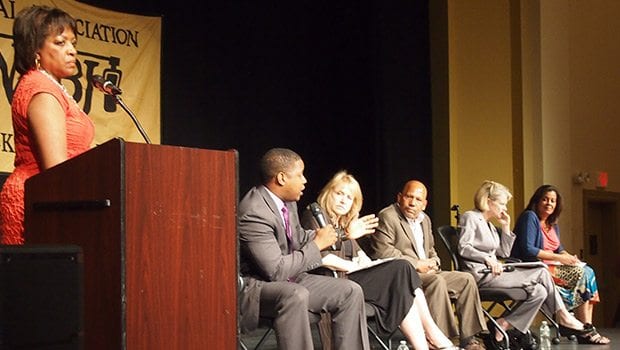NABJ kicks off Boston conference with forum on development, gentrification

Ideas flowed freely at the National Association of Black Journalists-sponsored town hall meeting, Development and Displacement in Boston.
Audience members and a five-person panel discussed ideas ranging from the development of middle-income housing to land trusts endowed with the powers of eminent domain.
The forum, part of the NABJ’s national convention last week, drew an audience of about 200 local housing activists, and local and national journalists.
While most major U.S. cities have seen rents and real estate values rise in recent years, Boston has been cited as one of the most expensive housing markets in the nation. While the city is undergoing a remarkable building boom that is redefining its skyline and creating new neighborhoods downtown and on the waterfront, rents are at an all-time high and 11 of the city’s 15 neighborhoods are undergoing gentrification.
“Gentrification is the movement of higher income and smaller households into low income neighborhoods,” noted Tufts University Professor James Jennings. “In Boston, that happens to be places where brown and black people live.”
Jennings and the other panelists began the conversation by discussing which displacement prevention strategies have worked. Dudley Street Neighborhood Initiative Executive Director Chris Jones described how his organization acquired the power of eminent domain, purchased vacant land and built deed-restricted affordable housing, stabilizing a community that had long been in decline.
“In 2008, when the bottom was falling out everywhere — especially in Boston — there were no foreclosures in the land trust area,” Brown noted, adding that the land trust model is a tool that could be used in other areas.
Dorchester Bay Economic Development Corporation Executive Director Jeanne DuBois touted her organization’s partnership with the Nuestra Communidad and Quincy Geneva CDCs to develop affordable housing and commercial space along Quincy Street. The partners secured a $70 million HUD Choice Community grant that enabled them to renovate existing affordable housing units and build new ones.
Madison Park Development Corporation CEO Jeanne Pinado spoke about how her organization acquired and built more than 1,700 units of affordable housing and redeveloped spaces like Hibernian Hall, the building where the forum was hosted, to redevelop the long-blighted Dudley Square area.
Looking to the future, Pinado said the CDC will build housing with varying degrees of affordability.
“We’re looking at how we can build low, middle and market-rate housing,” she said.
Department of Neighborhood Development Director Sheila Dillon outlined the challenges the city faces in retaining affordability. The cost of building new housing is $400,000 a unit. There are 28,000 families in Boston paying more than 50 percent of their income on rent. And while dozens of luxury apartment building are in various phases of construction in Boston, the city is only generating 250 new affordable housing units a year.
“It’s a crazy small amount,” Dillon commented.
Dillon noted that the administration of Mayor Martin Walsh is currently working on housing policy recommendations due to be released September 1, though she would not discuss the specifics of any plans the administration is considering. But the panelists at the discussion were not wanting for ideas, including expanding inclusionary development — the city ordinance that currently requires developers to make 15 percent of the units in new buildings affordable or contribute to the city’s Affordable Housing Trust.
Dillon did underscore the importance of city planners and housing developers discussing plans with neighborhood residents.
“The housing industry in Boston has become too complex,” she said. “We spend our time talking to syndicators, lawyers and architects. I think it’s distracted us from our mission.”
Most of the participants spoke about the importance of building affordable and moderate-income housing.
Pinado dismissed the common complaint that Roxbury has more than its share of affordable housing, noting that more than 50 percent of the units in Lower Roxbury — the area between Dudley Square and the South End — are project-based affordable housing.
“I see them as assets,” she said of the low-income housing developments. “People say ‘don’t you think we have enough?’ I say we have a good thing.”
Pinado said the parcels of publicly-owned vacant land in Roxbury should be set aside for more housing.
“We ought to prioritize [the land] for lower- and mixed-income housing,” she commented.
Largely absent from the forum was discussion of rent control, restrictions on condominium conversions and other government interventions in the housing market. When attorney John Drewry suggested participants consider re-instating rent control, Dillon noted that the city’s law was voted out in a 1993 statewide ballot referendum.
“There’s nothing we can do,” she said.
Lisette Le, VOTE coordinator for the Right to the City Coalition, said she and other affordable housing activists have been exploring the possibility of pushing for the reinstatement of rent control in Boston.
“It’s something people are talking about,” she said. “But there are a lot of people who don’t want us talking about it.”







